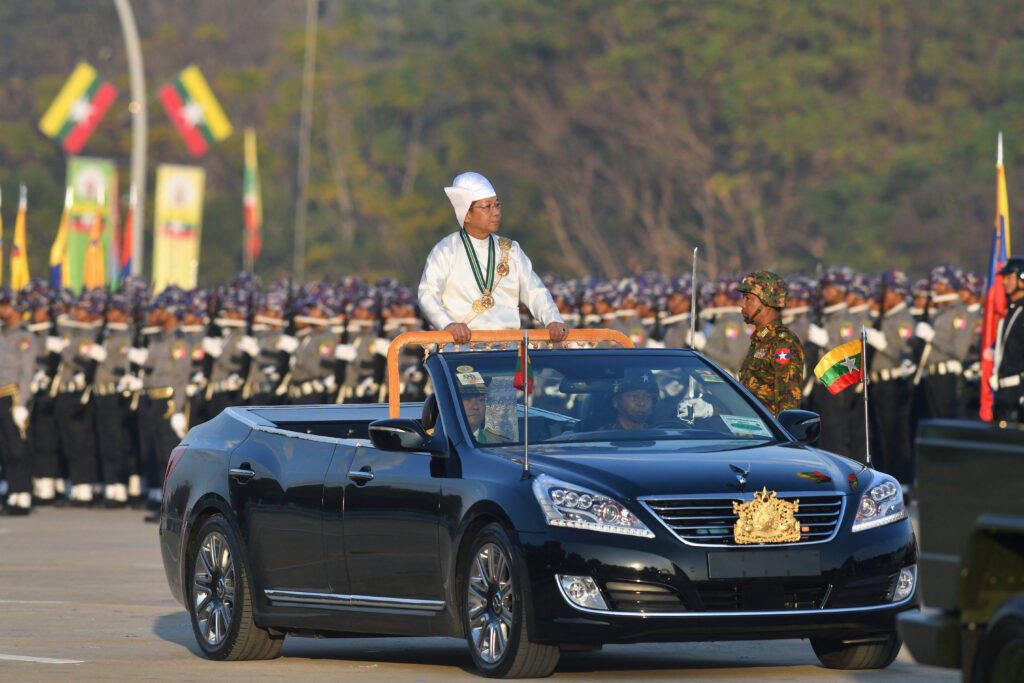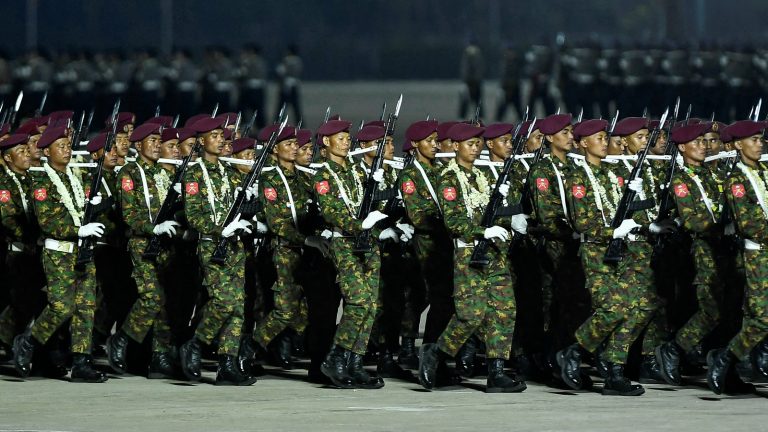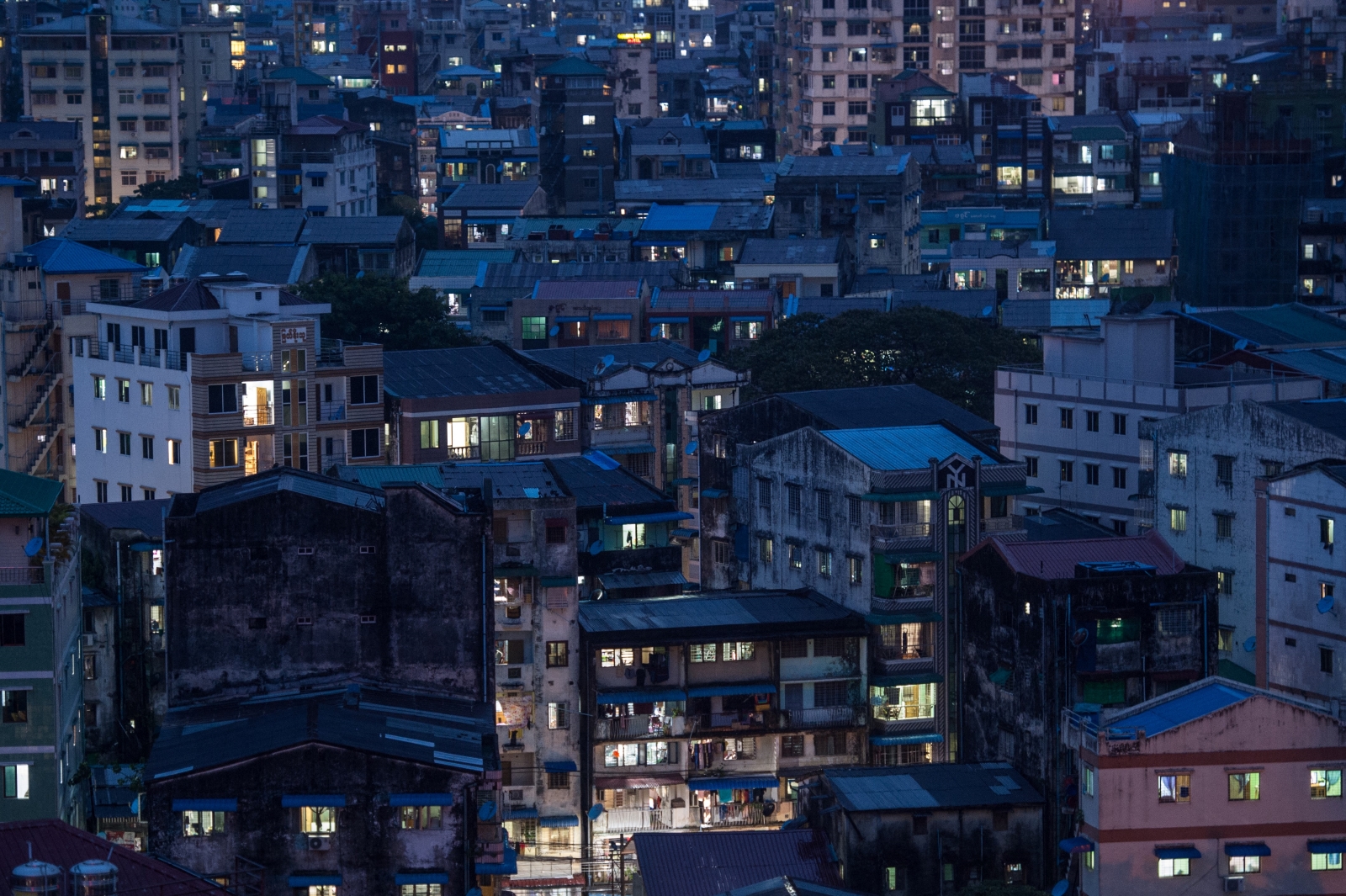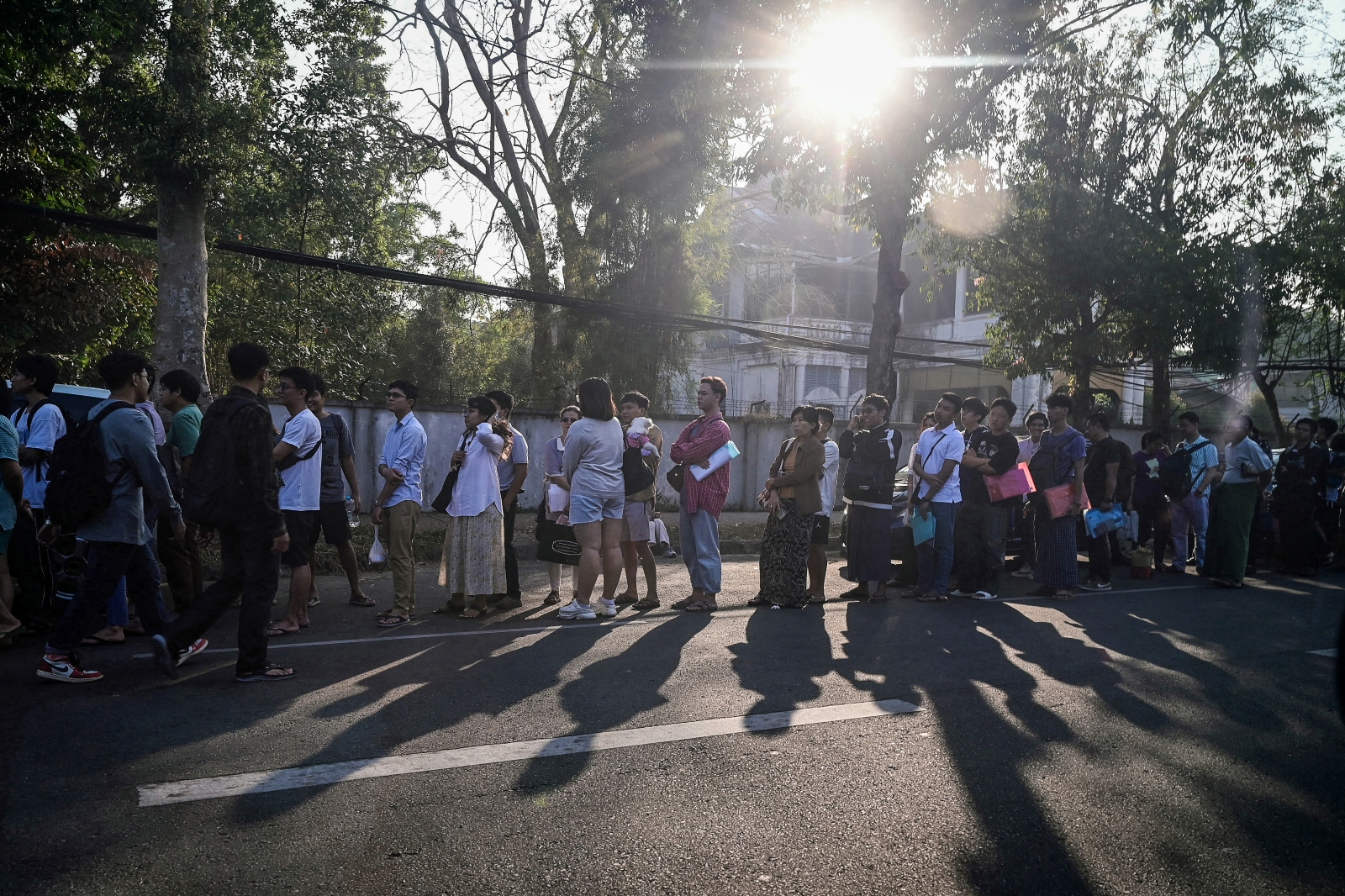Despite struggling to keep the lights on, the military regime has unveiled plans to electrify the nation’s transport system, with many of the initial import permits going to companies close to the generals.
By FRONTIER
Junta leader Senior General Min Aung Hlaing, who plunged Myanmar into a violent political crisis after seizing power in a February 2021 coup, is seemingly dreaming of turning the country into a green, electric-powered paradise.
Many of his public addresses have described this vision, including one in October 2021, when he said Myanmar must electrify public transport – including trains and buses – private vehicles and “heavy machinery”.
“We will adopt the plans to transform these vehicles into electric ones. If not, our country will lag behind the development of others,” Min Aung Hlaing told a meeting of the State Administration Council, as the junta is officially known.
Nearly 18 months later, experts say his plan remains a pipe dream. Nonetheless, early permission for the import of electric vehicles has been handed out to companies with connections to the military and its inner circle, heralding the return of a brand of crony capitalism that was fading away during the now-aborted democratic transition of 2011-2021.
As a pilot project, the regime granted permission for the import of 3,000 Battery Electric Vehicles this year, including passenger buses and taxi cars. The first batch of 40 cars produced by Chinese company BYD Auto arrived in February. Chin Dwin Shan Construction imported 30 of the cars, 10 of which were reportedly set aside to be used as taxis at Yangon International Airport, while NPK Motors imported the remaining 10, all of which are reserved as taxis serving Thapyaygone Market in Nay Pyi Taw.
NPK Motors is chaired by U Naing Phyo Kyaw, a co-founder and director of Seventh Sense, a film production company linked to Min Aung Hlaing’s daughter Daw Khin Thiri Thet Mon that has been sanctioned by the United States and Canada.
NPK Motors inaugurated Myanmar’s first charging station at Thapyaygone Market on March 4, with all 10 e-taxis proudly on display. But on subsequent visits by Frontier to the market, there were only three taxis, and an attempt to hire one on March 7 was unsuccessful.
A security guard watching over the vehicles told Frontier they were not in service yet due to a lack of qualified drivers. Drivers of conventional taxis based around Thapyaygone told Frontier that they hadn’t seen any of the e-taxis operating so far. NPK Motors did not answer repeated calls.
U Lyan Kyint Man, joint-secretary of Yangon Region Transport Committee, told Frontier on March 7 that the running of e-taxis in the commercial capital hadn’t started yet either. He said the already-imported vehicles have received registration numbers from the Road Transport Administration Department, but don’t have taxi licences yet and the charging stations aren’t ready either.
U Soe Gyi, an official from another company in Nay Pyi Taw given permission to import e-vehicles, told Frontier on March 4 that most companies hoping to enter the industry are still jockeying for contracts.
“At the moment, we can only fence our ground in. We will only be able to tell you more only when the e-cars arrive,” he said.
However, it appears to be easier for companies to fence that ground in if they have close ties to the military.
Dr Soe Tun, patron of Myanmar Automobile Manufacturer and Distributor Association, said that nine companies out of 26 that applied have been given permission to import electric vehicles.
Like many other business associations, the MAMDA has maintained friendly ties with the regime since the coup. Soe Tun is also a director for Soueast Motor Myanmar, according to records from the Directorate of Investment and Company Administration. Chin Dwin Shan, which imported e-cars as part of the pilot scheme in February, is registered to the same address as a Soueast showroom.
“By the end of March, hundreds of EVs will be here,” Soe Tun predicted. “Most of the charging stations will be completed in the first week of April.”
By mid-March another 112 vehicles had been imported, according to state media. Thirty-eight were imported by Grand Sirius, a company that donated medical equipment to the Tatmadaw in 2020. Grand Sirius is also the parent company of MoeZac, which according to investigative activist group Justice For Myanmar, once met with the military’s Directorate of Defence Industries regarding the supply of armoured vehicles.
Another 19 were imported by Earth Renewable Energy, a subsidiary of the Earth Group of Companies. The conglomerate’s chief executive officer is Daw Khine Zaw, the sister-in-law of infamous military crony and alleged arms broker U Tay Za, who has been sanctioned by the US, United Kingdom and European Union.
An economic analyst said that, similar to how military-linked tycoons behaved before 2011, companies are likely taking these contracts to support the junta’s policies and don’t expect to directly profit from the import of electric vehicles.
“They will expect a reward in the future (it’s an investment for these businesspeople),” he said via email. “Crony capitalism is coming back and you can see market concentration in trade and many other sectors.”
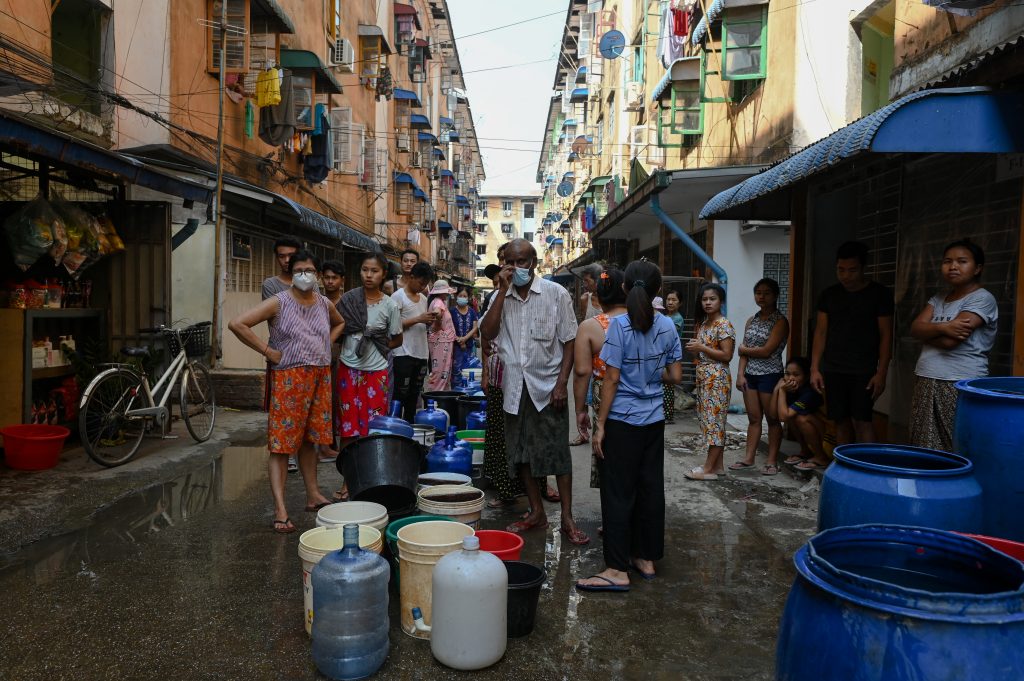
Running on empty
So far, conventional taxi drivers are unimpressed.
“There are only a few charging stations now and even if there were many, the electricity supply is not good,” said Ko Naing Win, a taxi driver in Nay Pyi Taw. “EV prices are also too high. As I see it, if they were used as taxis, it wouldn’t be profitable.”
However, MAMDA patron Soe Tun claimed there have already been many pre-orders, with prices of electric vehicles ranging from K60 million to over K140 million. K60 million is nearly US$30,000 at the official exchange rate, while the World Bank’s 2021 figures put Myanmar’s per capita annual GDP at around $1,200.
“We can see there’s a lot of interest in electric cars these days even though some speak negatively about the idea,” Soe Tun said.
He claimed charging stations are being built at existing fuel stations on the main highway connecting Yangon, Nay Pyi Taw and Mandalay and will later be expanded to other major routes.
But Sai Oo Kham, a Shan Nationalities League for Democracy MP who served on the transport committee in the lower house of parliament until the coup, said the junta leader is out of touch – not only with the needs of the population, but also his own regime’s ability to implement projects on the ground.
“Senior General Min Aung Hlaing may not know what is happening at the grassroots. I don’t think he would talk about such projects if he knew the truth. These projects are not practical,” he said.
Sai Oo Kham, who represented Hseni Township and still lives in northern Shan State, said the junta has struggled with even basic infrastructure projects, like maintaining the main highway in northern Shan. He said this road has deteriorated badly since the coup and plans by the regime to repair it are grossly behind schedule.
“In northern Shan State, the project paper said repair work on the road would be completed in 2022. But if we ask the workers when it will be finished, they say they can do nothing, not only because of the budget but also because of the political situation,” he said.
Meanwhile, for ordinary people suffering under the junta’s economic mismanagement, plans to electrify the transport system feel more like a fever dream than a realistic goal.
“Senior General Min Aung Hlaing is talking about uplifting the [small and medium enterprise] sectors, but he can’t even manage to get regular electricity, which is a basic need for SMEs,” said a woman from Mandalay who manufactures and sells food products. “He should prioritise getting regular electricity for the country before electric cars or trains.”
Soe Tun acknowledged that electricity supply is a challenge but echoed Min Aung Hlaing by insisting the entire world is switching to electric transport, meaning Myanmar must act now or be left behind.
“European countries are trying to completely electrify their transport system by 2035,” he said. “So, we see this is a trend that we must follow sooner or later. Now, there are many challenges for us, but we must move forward step by step.”
However, Mr Guillaume de Langre, a former advisor on energy policy to the overthrown civilian government, said Myanmar is producing 30 percent less electricity today compared to 2020, with “no credible plan to fix the situation in the next five years”.
“They can’t even supply stable power to Nay Pyi Taw. Look at every SAC announcement about energy since their coup. Where are the solar projects? Where is the [liquified natural gas]? Where are the new power lines to Laos and China?” he said, referring to the regime’s failure to move ahead on most power generation projects, thanks to walkouts by existing investors and failure to attract new ones.
“We don’t know about electric cars or electric trains,” said a woman in Nay Pyi Taw’s Zabuthiri Township. “We just want basic commodity prices to go back to normal.”


